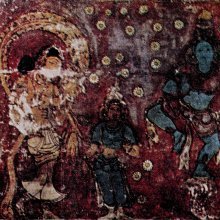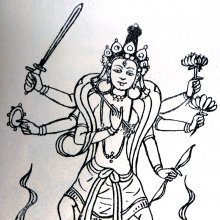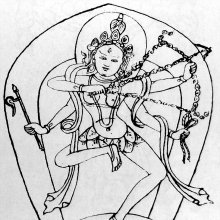Subjugation, Subjugated, Subjugate, Subjugating: 2 definitions
Introduction:
Subjugation means something in Hinduism, Sanskrit. If you want to know the exact meaning, history, etymology or English translation of this term then check out the descriptions on this page. Add your comment or reference to a book if you want to contribute to this summary article.
Images (photo gallery)
In Hinduism
Yoga (school of philosophy)
Source: ORA: Amanaska (king of all yogas): A Critical Edition and Annotated Translation by Jason BirchSubjugation (of the world) is denoted by the Sanskrit term Vaśya, according to the Amanaska Yoga treatise dealing with meditation, absorption, yogic powers and liberation.—Accordingly, as Īśvara says to Vāmadeva: “[...] [Now], I shall define the nature of that highest, mind-free absorption which arises for those devoted to constant practice. [...] [The yogin] whose absorption in the steady self remains for twenty-eight days, obtains the Siddhi of control, by which he subjugates the world (vaśya-kṛt) [vaśyakṛjjagat]. [...]”.

Yoga is originally considered a branch of Hindu philosophy (astika), but both ancient and modern Yoga combine the physical, mental and spiritual. Yoga teaches various physical techniques also known as āsanas (postures), used for various purposes (eg., meditation, contemplation, relaxation).
Shaktism (Shakta philosophy)
Source: Google books: Genesis and Development of Tantra (Shaktism)Subjugating people (to one’s will) is denoted by the Sanskrit term Vaśyā and represents one of the various Supernatural Powers (siddhi) according to the Siddhayogeśvarīmata: an ancient Sanskrit text devoted to cults of Goddesses as the Vidyāpīṭha or Vidyā Corpus.—In the Siddhayogeśvarīmata, the objectives of rituals are classified as siddhis [e.g., subjugating people to one’s will (vaśyā)]. They belong to the category of supernatural phenomena and seem to be considerably different from the types of wish people expected to gain from the Vedic rituals that still remained within the sphere of everyday life.

Shakta (शाक्त, śākta) or Shaktism (śāktism) represents a tradition of Hinduism where the Goddess (Devi) is revered and worshipped. Shakta literature includes a range of scriptures, including various Agamas and Tantras, although its roots may be traced back to the Vedas.
See also (Relevant definitions)
Full-text (+350): Jitendriyatva, Damana, Paraglani, Vasita, Damita, Vasa, Samvrita, Vashya, Karadikrita, Paratamtra, Jera, Paradhina, Yuga, Paradhin, Vasaga, Maddanta, Pileti, Dami, Maddati, Vashikri.
Relevant text
Search found 137 books and stories containing Subjugation, Subjugated, Subjugate, Subjugating; (plurals include: Subjugations, Subjugateds, Subjugates, Subjugatings). You can also click to the full overview containing English textual excerpts. Below are direct links for the most relevant articles:
Guhyagarbha Tantra (with Commentary) (by Gyurme Dorje)
Text 20.5 (Commentary) < [Chapter 20 (Text And Commentary)]
Text 20.18 (Commentary) < [Chapter 20 (Text And Commentary)]
Text 1.3 (Commentary) < [Chapter 1 (text and commentary)]
Mahabharata (English) (by Kisari Mohan Ganguli)
Section XCVI < [Rajadharmanusasana Parva]
Section XXXI < [Digvijaya Parva]
Section CCXII < [Rajya-labha Parva]
The Agni Purana (by N. Gangadharan)
Chapter 138 - The six accessory acts relating to all Mantras (ṣaṭkarman)
Chapter 123 - Description of the Svarodayacakra, etc.
Chapter 323 - The mantra of the weapons of Aghora and the six constituents
Brihad Bhagavatamrita (commentary) (by Śrī Śrīmad Bhaktivedānta Nārāyana Gosvāmī Mahārāja)
Verse 2.3.147 < [Chapter 3 - Bhajana (loving service)]
Verse 2.4.227 < [Chapter 4 - Vaikuṇṭha (the spiritual world)]
Verse 2.4.77 < [Chapter 4 - Vaikuṇṭha (the spiritual world)]
Manusmriti with the Commentary of Medhatithi (by Ganganatha Jha)
Verse 7.44 < [Section IV - Duties of the King]
Verse 7.15 < [Section II - Punishment (daṇḍa)]
Verse 2.93 < [Section XVIII - Control of Sensual Desires]
Mudrarakshasa (literary study) (by Antara Chakravarty)
1. Patākāsthānaka used in Mudrārākṣasa < [Chapter 6 - Other Literary Estimates of Mudrārākṣasa]
Related products









